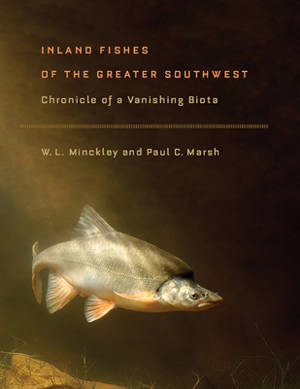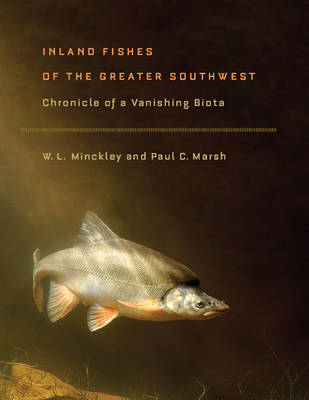
Wil je zeker zijn dat je cadeautjes op tijd onder de kerstboom liggen? Onze winkels ontvangen jou met open armen. Nu met extra openingsuren op zondag!
- Afhalen na 1 uur in een winkel met voorraad
- Gratis thuislevering in België vanaf € 30
- Ruim aanbod met 7 miljoen producten
Wil je zeker zijn dat je cadeautjes op tijd onder de kerstboom liggen? Onze winkels ontvangen jou met open armen. Nu met extra openingsuren op zondag!
- Afhalen na 1 uur in een winkel met voorraad
- Gratis thuislevering in België vanaf € 30
- Ruim aanbod met 7 miljoen producten
Zoeken
Inland Fishes of the Greater Southwest
Chronicle of a Vanishing Biota
W L Minckley, Paul C Marsh
Paperback | Engels
€ 62,95
+ 125 punten
Omschrijving
This comprehensive new book replaces and substantially expands upon the landmark Fishes of Arizona, which has been the authoritative source since it was first published in 1973. Inland Fishes of the Greater Southwest is a one-volume guide to native and non-native fishes of the lower Colorado River basin, downstream from the Grand Canyon, and of the northern tributaries of the Sea of Cortez in the United States and Mexico. In all, there are in-depth accounts of more than 165 species representing 30 families. The book is not limited to the fish. It provides insights into their aquatic world with information on topography, drainage relations, climate, geology, vegetational history, aquatic habitats, human-made water systems, and conservation. A section of the book is devoted to fish identification, with keys to native and non-native families as well as family keys to species. The book is illustrated with more than 120 black-and-white illustrations, 47 full-color plates of native fishes, and nearly 40 maps and figures. Many native fish species are unique to the Southwest. They possess interesting and unusual adaptations to the challenges of the region, able to survive silt-laden floods as well as extreme water temperatures and highly fluctuating water flows ranging from very low levels to flash floods. However, in spite of being well-adapted, many of the fish described here are threatened or endangered, often due to the acts of humans who have altered the natural habitat. For that reason, Inland Fishes of the Greater Southwest presents a vast amount of information about the ecological relationships between the fishes it describes and their environments, paying particular attention to the ways in which human interactions have modified aquatic ecosystems--and to how humans might work to ensure the survival of rapidly disappearing native species.
Specificaties
Betrokkenen
- Auteur(s):
- Uitgeverij:
Inhoud
- Aantal bladzijden:
- 478
- Taal:
- Engels
Eigenschappen
- Productcode (EAN):
- 9780816534289
- Verschijningsdatum:
- 20/07/2016
- Uitvoering:
- Paperback
- Formaat:
- Trade paperback (VS)
- Afmetingen:
- 213 mm x 277 mm
- Gewicht:
- 1338 g

Alleen bij Standaard Boekhandel
+ 125 punten op je klantenkaart van Standaard Boekhandel
Beoordelingen
We publiceren alleen reviews die voldoen aan de voorwaarden voor reviews. Bekijk onze voorwaarden voor reviews.











